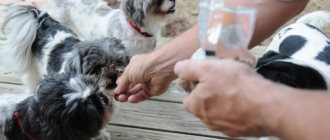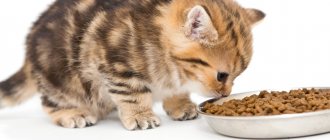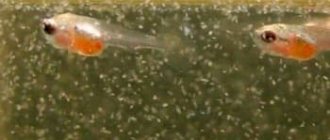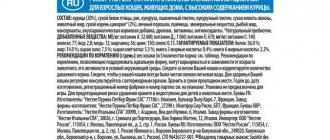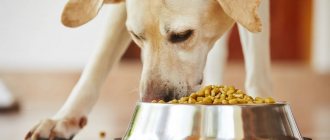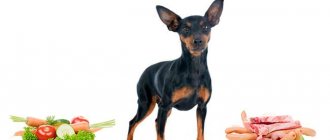Important points
Yorkies can be called quite demanding guys. This applies to both attention and food preferences.
Be sure to keep in mind that all responsibility for the baby’s health lies with you. Its appearance, condition of teeth and even mood will depend on your correct or incorrect choice.
Yorkies are selective , this is not a dog that you can feed from the table and not think about creating a special menu. This can harm your dog to varying degrees, from digestive problems to death.
Moreover, Yorkshire terriers often refuse to eat on their own and wait until their owners hand feed them. This is an example of improper upbringing , everything is in your hands.
Of course, every dog is different. Even its appearance will depend on the character of your pet. Playful and active Yorkies remain thin, but phlegmatic dogs that do not know moderation in their food run the risk of becoming obese.
The owner’s task is to track all the features of your Yorkie in a timely manner . If he is prone to uncontrolled overeating, limit his portions; if he is inactive, take him for walks regularly and put him on a diet.
Newborn care
The Yorkie puppy spends the first days and months with its mother. The life of tiny babies weighing from 80 to 120 grams completely depends on the amount of milk from their mother . The sucking reflex is innate in babies, however, if you notice that your Yorkie cannot cope on its own, gently hold it near the fullest nipple .
In general, problems should not arise during the natural feeding stage. The first two weeks are very revealing, so puppies must be weighed daily . Normal weight gain is considered to be at least 5 grams per day, after a two-week mark - at least 10 grams per day.
If a situation suddenly arises when the bitch cannot feed the puppies on her own, it is necessary to introduce her milk replacer and feed them every 1-2 hours. colostrum for at least a day , otherwise they most likely may not survive.
How can you help your baby? Prepare a milk mixture from cow or goat milk, one yolk, cream, 40% glucose solution and oil solutions of vitamin A and D. Be sure to heat the mixture to 30-35 degrees.
What should a nursing bitch eat?
The health of the puppies directly depends on the mother's nutrition. During lactation, the animal requires a special approach to nutrition. A nursing dog eats up to 4 times more than normal .
Carefully monitor the quality of products. The diet for the first days should include fermented milk products (low-fat), cereals and plenty of water .
Next, the dog should eat as usual: either dry food or natural food. Among dry food, you can choose specialized food for lactating bitches. During feeding, the number of meals increases up to 6 times .
Food for a nursing bitch must meet the following criteria:
- nutritional value;
- the percentage of protein in the composition is from 24 to 28%;
- high content of minerals and vitamins.
Feeding Basics
From birth, puppies eat nothing but mother's milk, which contains all the necessary substances for the babies to develop correctly.
After three to four weeks, the breeder gradually begins to introduce complementary foods. Which one is up to you to decide: it can be soaked pieces of dry food or small balls of lean meat. He then carefully observes what food the puppies eat best and what type of stool they have after feeding. The breeder must choose the right complementary foods for Yorkshire terriers, otherwise the mini dogs will experience problems with the gastrointestinal tract from the first month of life.
Like the breeder, you must take a responsible approach to such matters as feeding your Yorkshire Terrier. Be sure to ask the dog’s former owner what kind of food or natural food he fed it. In the first month, you only need to give the food that the puppy ate before. Then gradually transition the dog to a new type of food. You can't do this.
Moving a Yorkshire Terrier to a new place is already a lot of stress for him. And if you suddenly change your diet, then problems definitely cannot be avoided. At a minimum, the pet will begin to eat poorly, he will begin to have health complications, and it is unknown how long this will last and how it will end.
Beautiful appearance, good condition of coat and dental system, mental state of the Yorkshire Terrier dog, care and nutrition - all this will be your responsibility and will depend only on you.
Yorkshire Terriers eat premium food, so be prepared to pay a pretty penny for it. But they are of high quality and guarantee the health of the digestive system, but you can prepare treats with your own hands.
There are two types of food sold: dry and canned.
It’s up to you to decide what you can feed your Yorkshire Terrier and what kind of food.
We will offer only a few proven brands that have the best food for Yorkies, a special line of food for representatives of this breed:
- Royal Canin. Yorkshire Terrier (there is also specialized food for puppies of this breed);
- Pro Plan - food for small breeds;
- Acana - food for small breeds (the peculiarity is that it does not contain rye, gluten, or corn);
This is only a small part, there is a great variety of food. To avoid running your eyes and asking questions about what is the best food and from which manufacturers for Yorkies, first go to the veterinarian. He will advise you on what you can feed your Yorkie besides dry food, which is suitable for your pet.
Advice! When buying a puppy, ask the breeder what is the best food to feed your Yorkie and how he fed the baby. Moving is already a big stress for the dog, so there is no need to suddenly change the diet.
With newborn puppies, everything is usually simple - they must be fed by their mother. However, sometimes there is not enough milk, then what should you feed your Yorkie puppy?
In this case, you need to purchase special mixtures that will replace part of the milk, and give them a little every 2 hours.
After the baby is 2 weeks old, you can start feeding. The first step is goat's or cow's milk.
They warm it up and give the puppy a teaspoon. if the body responds well, the dose is gradually increased.
Somewhere after the fourth week, we start giving the puppy low-fat cottage cheese and even porridge. But we introduce everything into the diet gradually, at first giving it once a day and a teaspoon. Milk remains the main source of nutrition.
But what to feed a 2-month-old Yorkie puppy is up to the owner to decide. He can gradually introduce meat (first finely chopped raw, and then only boiled), fish and other important foods for the Yorkshire Terrier's diet.
You need to carefully monitor your body's reactions to new foods.
Puppies under two months of age are fed 6 times a day, up to four months - 5 times, up to six months - 4 times, up to a year - 3 times.
After a year, the individual is considered an adult, which means it needs to be fed 2 times a day. The serving size is calculated in the same way: one tablespoon per half a kilogram of animal weight.
Important! Do not make sudden changes to a different number of meals, do it gradually.
Firstly, in this situation you should not radically change your diet, as this will be unnecessary stress.
If you have been feeding your bitch dry food, continue to do so. Just replace the food with a special one for the lactation period.
If you were fed homemade food, then start giving more dairy products.
Advice! During this period, the dog needs to be fed up to 6 times a day, and the volume of food increased to 4 times.
The main thing is that the dog does not feel exhausted; do not be afraid to overfeed it, it will not take too much. Also try not to give her a lot of raw fruits and vegetables.
There are three options for feeding your dog:
- feeding with natural food, when food is prepared at home especially for the pet;
- soft canned food;
- dry food.
- they are hygienic (provided they are stored correctly);
- balanced in composition (high quality);
- immediately ready for use.
- they become boring (especially important for capricious children);
- may contain chemical additives;
- there is no guarantee that they contain only high-quality ingredients;
- It is difficult to choose a quality product due to unfair advertising.
If your baby refuses to eat, do not immediately sound the alarm. It is quite possible that he simply decided to have a fasting day.
Some of the disadvantages of prepared foods can be circumvented. To do this, you should consult with puppy breeders or experienced dog breeders who are not interested in promoting certain brands of dog food. There is virtually no information on the Internet on this topic, which is why we have opened a dry food review section on our website.
As for preparing food yourself, this type of feeding your pet is suitable for a person who is passionate about the kitchen and has free time for experiments. In this case, your pet will receive fresh, varied food and will not be deprived of gourmet pleasures.
We suggest you read: Making a poultry house for ducks yourself
When preparing natural food for Yorkies yourself, you should follow the following rules:
- A diet containing half protein foods (meat, fish, cottage cheese), a quarter carbohydrates (buckwheat, wheat or rice porridge) and a quarter vegetables and fruits can be called rational.
- The meat chosen is lean. By-products can include udder, heart, lungs, liver, and offal.
- The fish is given only boiled, with the bones carefully selected. Pollock, hake, haddock and whiting interfere with the absorption of iron in the dog's body, so these species are best given infrequently.
- From eggs, only the yolk is suitable for dog dishes, and from dairy products - low-fat cottage cheese without fruit fillers.
- Vegetables and fruits are cut into small pieces or tinder.
- Dishes are seasoned with a drop of olive or linseed oil.
- With a natural diet, your pet will need mineral supplements and vitamins.
- All products must undergo heat treatment, especially meat and fish. Food is offered to your pet warm or at room temperature. This rule is especially important for puppies.
- Excess protein in your Yorkie's diet can cause allergies or kidney disease.
Natural feeding is not scraps from a family dinner, it is a carefully calculated diet made from many ingredients.
| Product | Consequences |
| pork and lamb | increased load on the liver |
| sweets, chocolate, pastries, desserts, fresh bread | cause dermatitis and diarrhea |
| natural bones | source of injuries and broken teeth |
| oatmeal, pearl barley | little nutritional value, may cause allergies |
| smoked meats, pickles, sausages, hard cheeses | kidney disease, pancreas |
| milk | not absorbed by the body, causes diarrhea |
| cabbage, legumes, potatoes | are not digested, cause flatulence |
Puppies begin complementary feeding at three weeks of age. Their first food, in addition to mother's milk, can be cottage cheese, grated vegetables, and liquid porridge. Start with one feeding per day, immediately after suckling milk. Gradually the number of feedings is increased to five. By the tenth week, puppies can only eat from a saucer. At the age of six months, babies will switch to three meals a day, and by one year - to two meals a day.
You need to feed the kitten with nutritious, high-quality food. You should know that a small Yorkie requires a lot of energy. But his stomach is much smaller than that of an adult dog, so the daily amount of food is divided into several meals.
Up to two months the puppy is fed 6 times a day, up to 4 months - 5 times, at 5 months - 4 feedings, at 6 months - 3 feedings. At 10–12 months and for the rest of life, feeding is done twice a day.
Portions are increased gradually, which prevents overeating and stomach distension. The daily food intake for a small dog is 1 tablespoon for every 500 g of weight. If the puppy weighs 1 kg, 2 tablespoons of food are divided by the number of feedings per day.
If the dog has an active temperament, if the kitten wants to eat all the time, the volume of food can be increased; for less active pets, it can be reduced. To understand whether your pet has enough food, evaluate its fatness, general condition and activity. If the little one looks cheerful, happy, has shiny fur and is not thin in appearance, then you should not pay attention to the pleading looks. Soon the dog will understand that the owner’s pity will not satisfy him. Remember that if you feed meat in the evening, your pet will not ask for more until the morning.
Every loving owner must observe the nuances of keeping a Yorkshire Terrier. This is especially true for the nutrition of puppies.
Experts have developed basic feeding rules that allow you to raise a strong, healthy, obedient pet:
- Preventing the puppy from overeating, which leads to a decrease in activity.
- Strict adherence to the number of feedings.
- The meal time is 20 minutes; the pet must get used to eating within this period.
- Natural food should be cooked immediately before serving.
- When feeding by drying, the presence of clean water nearby is mandatory.
At 1 month, the baby has enough mother's milk, but he is already actively interested in the world around him. During this period, complementary feeding can be introduced, and if lactation is insufficient, then feeding begins earlier with cow's milk. A one-month-old baby will need calcined cottage cheese, liquid semolina porridge, and boiled meat. It is better to give dry food, pre-soak the granules in water.
We invite you to read: How do food allergies manifest in cats? What to feed a cat with allergies?
Feeding the puppies
Starting from the end of the second week, you may think about introducing complementary foods . Add one food item to your diet once a day.
Goat, sheep or cow's milk (warmed), kefir and fresh cottage cheese are perfect for starting complementary feeding . Literally a teaspoon at a time. After making sure that complementary foods are well absorbed and do not cause problems in the dog’s digestion, increase the number of complementary feedings to 2-3 times a day.
Starting from the middle of the 4th week, you can diversify your diet by eating meat . Finely chop the raw meat, add a little warm water and give it to the puppy to try. After a couple of weeks of this diet, you can give boiled meat several times a day.
By the end of the 6th week, the puppy's nutrition will look something like this: 2 milk meals, 2 meat meals and 2 more with mother's milk.
It is important to approach your dog's diet correctly. It directly depends on the age of the puppy .
- From 3 to 6 months – 4 meals a day.
- From 6 to 12 months – write 3 times a day.
- From one year and older – 2 meals a day.
Feeding an adult dog
Regardless of the diet, it is necessary to follow a feeding regimen - this has a beneficial effect on digestion and the stability of the gastrointestinal tract.
An adult dog should be fed twice a day, focusing on the optimal proportions of foods when preparing the diet:
- 50% – animal protein;
- 25% – fruits and vegetables;
- 25% – cereals.
Approximate diet:
- meat – 80 g;
- cereals – 20 g;
- fruits and vegetables – 40 g;
- fermented milk products – 20 gr.
The serving size depends on the age, metabolism and physical activity of the pet.
NOTE!
In the diet for older dogs, it is necessary to reduce the amount of proteins and fats and increase the content of carbohydrates and dietary fiber, as well as add glucosamine and chondroitin.
What is strictly forbidden to feed a Yorkie?
Under no circumstances should you mix dry and natural food . You must choose one path and follow it all the time.
Always remember the list of these products and never let your pet eat them :
- Sweet . No cakes, pastries or sugar. Even if he asks a lot. Never and in any form if you do not want to treat a diseased liver, diabetes or teeth.
- Salt . Do not salt the food. Salt for dogs is pure poison. Spices and other strong-smelling ingredients can deprive your dog of his sense of smell.
- Yeast dough and bread .
- Lamb and pork are too heavy meats for Yorkies.
- Bones . The Yorkie is not a dog that should be allowed to chew on a bone. Unless they are toys from a special store.
- Grapes and raisins harm the kidneys.
- Raw fish is extremely dangerous for a dog's life.
- Onions in any form.
- Any seeds or pits because they may contain cyanide toxin.
- Alcohol.
Treat your dog's nutrition responsibly, feed it high-quality food or food, and avoid eating prohibited foods. Don't feed your Yorkie food that is too hot or cold.
Give your dog 15 minutes to eat, then remove the bowl. Don't worry if he hasn't eaten in these 15 minutes, just offer him again in a few hours.
If you have any doubts, consult with breeders or veterinarians, and then your dog will be well-fed and healthy.
What to feed your Yorkshire Terrier at home?
Many owners ask this question, because high-quality super premium dry food for Yorkies is quite expensive, and many owners do not trust even expensive food.
Now we will list the foods that should be given to the terrier, and then we will tell you a few rules for creating a diet.
So, what to feed your Yorkie at home:
- boiled meat (only lean: chicken, beef, turkey; pork, lamb - prohibited);
- cereals (rice and buckwheat porridge in water without additives);
- boiled sea fish without bones (except pollock);
- eggs (can be chopped boiled or scrambled eggs);
- fermented milk products: cottage cheese (low-fat), fermented baked milk, kefir (milk should not be given to adult terriers);
- fruits (apples, bananas, melon, watermelon);
- vegetables (boiled carrots, zucchini, preferably chopped and with the addition of vegetable oil).
These are the main products that should be included in the diet.
Important! Your Yorkie should be fed meat every day, replacing it with fish 1-2 times a week.
Also give the dairy products listed above every day, an egg a couple of times a week.
Cereals are used in natural nutrition, which means preparing porridge with meat and vegetables. Fruits are something like a dessert; it is better not to abuse them.
Now how to properly feed a Yorkshire Terrier:
- The serving size is calculated as follows: for half a kilo of the animal’s weight you need to put 1 tablespoon of food (adults weigh about 3 kg, which means you need to give 6 tablespoons per meal);
- adult Yorkies eat 2 times a day;
- 20-30 minutes after eating, the leftovers must be removed;
- Your pet should always have warm, clean water;
- food should not be cold or hot;
- approximately half of the diet is meat;
- even if the diet is ideal, the dog needs additional vitamins (this kind of supplement can be purchased at the veterinary store)
We suggest you read: Vomiting of undigested food in a cat
Just in case, here is a list of foods that should not be given to your pet:
- food with seasonings and salt: not sea fish, broth, bones, semi-finished products, preserved baked food, legumes, raw eggs;
- sugar and sweets, citrus fruits (strong allergens), juice
- milk and flour products: pasta, bread, rolls, etc.
Advice! Eating natural products is a very time-consuming activity. If you don't have time to prepare special food for your pet, you can buy food.
When can you feed Yorkie puppies and with what?
Feeding and weaning of puppies
From 3-4 weeks, you can start feeding puppies food in liquid or porridge form. In an earlier period, you can practice supplementing puppies with milk replacers, which is justified for large litters that cannot grow normally without additional complementary foods. The reason for insufficient weight gain may be competition between puppies and pushing aside weaker ones. In this case, underweight puppies must be supplemented.
What to feed puppies? The food they will eat after weaning. If we are talking about ready-made food, then it is better to take specialized food for puppies of this breed group (dry food must be soaked, wet food must be heated in a water bath without overheating). If this is a homemade puppy food, it should be ground after cooking (puree it in a blender). That is, homemade food should be quite liquid - the consistency of a thin puree. Also, many manufacturers have special ready-made mixtures for feeding puppies, usually called “puppy porridge.”
At what age can puppies start feeding complementary foods?
From 3 weeks you can start complementary feeding. The feed mixture should be fresh and heated to body temperature (38-39°C). At first, puppies, as a rule, pay little attention to food, because the main supply of nutrients comes from milk. But when one puppy starts eating food, the rest follow suit.
If puppies ignore the food, you should gently try to attract them to it - by gently bringing your nose closer to the food or by placing a small amount of it in your mouth with your finger. Coercive measures are, of course, strictly excluded.
Feeding complete (commercial) puppy food. When switching puppies from 3-4 weeks to semi-solid food, it is recommended to choose a fairly energy-intensive food (specialized for puppies) and add water to turn it into a thick porridge. Canned (wet) food is diluted with water in a 1:1 ratio; dry food requires adding three times the amount of water. The water for soaking dry food should be at a temperature of approximately 50 degrees, then soaking the food will take 10-15 minutes. If the water is colder, the food will take longer to soak. The food should be at least at room temperature, and preferably at body temperature . If a bag of food is placed on the balcony (or in a cold room) in winter, the food may soak longer, which already violates the conditions for using the food. Warm it up before soaking it.
Webinars for breeders and dog owners
Webinar on feeding a puppy from the first day of life -
How to feed newborn puppies? How to feed? How to wean? Is my puppy growing properly? Supplements – necessary or not? When to switch to adult food? Examples of homemade diets. Is a mixed diet taboo or sometimes okay? Commercial feeds - can they be combined and how correctly?
Webinar 101 questions about feeding dogs and cats -
Answers to the most common and controversial questions about feeding dogs and cats. Everything that is hotly debated: conflicting opinions, myths and facts, truth and fallacy. We collected 101 questions and provided a scientifically proven answer to each.
BARF webinar - all the pros and cons -
You will learn a lot about the properties of the components of BARF diets, the hygienic aspects of such feeding, and general questions and answers that are often heard in the practice of a veterinary nutritionist.
Dietetics course for breeders and dog trainers -
A course of 15 webinars teaches the basics of feeding dogs and cats. You will learn to compare foods and feeding techniques. Learn the principles of diet planning. Study feeding puppies and kittens, adult dogs and cats, during pregnancy and lactation, overweight, and different activity levels.
Basic knowledge
The average fat content of a bitch's milk is 9-10%. The substitutes you choose should have exactly the same fat content or slightly less. Often, owners make a common mistake and start feeding their puppies too early. Often this is not necessary. If the puppies sleep most of the time and gain weight normally, then everything is fine and there is no need to get up at night with the intention of bottle-feeding them. Don't forget that a bitch produces as much milk as her puppies drink. That is, with supplementary feeding you will stimulate a decrease in its amount.
When to offer puppies a saucer
It depends on the specific situation. There are objective reasons why you need to supplement earlier. If the mother's milk supply is low or the litter is very large, goat's milk is the best choice. It is advisable to use raw, whole. You can add one yolk to a glass of milk. Before reaching four weeks of age, it is best to use quail eggs, and then add chicken eggs.
It makes sense to start feeding puppies at 14 days of age if weight gain has slowed down. If they continue to recover well, you can defer the introduction of additional feeds for another week. Or you can wait another week and start weaning on solid food from four weeks of age.
Second month of life
The beginning of complementary feeding for puppies marks a new stage in the lives of babies. Now they are less and less dependent on their mother and spend more and more time exploring the world around them. Starting from week 5, additional foods can be introduced into the diet, one every three days. It is very important to prioritize the range of meats. Veal is a choice for first feeding, but not the only one. The only limitation is fatty pork, as well as pieces of lamb with tail fat. By the way, fatty chicken is also prohibited; you need to choose a young bird or remove excess fat.
At this age, milk ceases to play a primary role in the lives of babies. Now it is gradually being replaced by fermented milk products. It is best to prepare them for puppies yourself. In this case, you can be confident in the quality of the finished product. At the same time, raw calcined foods are better absorbed, so you should give them preference.
The first foods for puppies are an introduction to basic foods. Therefore, take into account the tender stomachs of babies and give them food in small portions. This will avoid stomach problems, bloating and diarrhea. Like a small child, a puppy’s gastrointestinal tract is still imperfect.
Vitamins and minerals
When to start feeding puppies, each owner decides independently, focusing on their charges. If the mother feeds them well, then calmly enjoy a carefree life until they are 3-4 weeks old. But if the bitch does not have milk or, even worse, she gets sick or dies, then you will have to take care of feeding the babies.
From 6 weeks, puppies begin to be offered raw fish. It is a source of phosphorus and calcium. From this time you can begin to introduce vegetables and fruits into your diet. These are apples and carrots, lettuce and cucumbers, zucchini and pumpkins. Fish and meat bones can be fed to the puppy in ground form, mixed with meat. Do not forget that their share should not be more than 15%. You can and should give your kids large beef bones. This is a toy and a treat, and also a necessary thing for scratching growing teeth. But bones should only be given to well-fed puppies at night. At this age they are fed 6 times a day, and by 8 weeks the number of feedings is reduced to 3-4 times a day.
How much and how often to feed
You need to feed the kitten with nutritious, high-quality food. You should know that a small Yorkie requires a lot of energy. But his stomach is much smaller than that of an adult dog, so the daily amount of food is divided into several meals.
Up to two months, a puppy is fed 6 times a day, up to 4 months - 5 times, at 5 months - 4 feedings, at 6 months - 3 feedings. At 10–12 months and for the rest of life, feeding is done twice a day.
Portions are increased gradually, which prevents overeating and stomach distension. The daily food intake for a small dog is 1 tablespoon for every 500 g of weight. If the puppy weighs 1 kg, 2 tablespoons of food are divided by the number of feedings per day.
If the dog has an active temperament, if the kitten wants to eat all the time, the volume of food can be increased; for less active pets, it can be reduced. To understand whether your pet has enough food, evaluate its fatness, general condition and activity. If the little one looks cheerful, happy, has shiny fur and is not thin in appearance, then you should not pay attention to the pleading looks. Soon the dog will understand that the owner’s pity will not satisfy him. Remember that if you feed meat in the evening, your pet will not ask for more until the morning.
From 8 weeks
By this time, the digestive system has time not only to form, but also to get stronger. Puppies can start giving offal. But you also need to choose them carefully. For example, the puppy will swallow chicken necks, but will gnaw on the backs. Tripe can also be given in the proportions recommended for adult animals. The frequency of feedings is now gradually decreasing, but the portion is increasing.
A baby at this age eats as much as an adult dog of the same breed, if you take the daily amount of food. Males always eat more than females. For normal digestion, you must add chopped fresh herbs. By this age, the number of feedings per day is reduced to three, but the diet should still include fermented milk products.
Vitamins and supplements
With a natural type of feeding, vitamins and supplements must always be present in the diet of a Yorkshire Terrier puppy. Natural sources of nutrients:
- Meat and bone meal.
- Bran.
- Fish, chicken, beef liver.
- Greens, vegetables, fruits.
- Sunflower oil, olive oil.
- Brewer's yeast.
- Cartilage raw and boiled.
Pharmacy vitamin supplements:
- Fish fat.
- Feed tricalcium phosphate.
- Omega-3, Omega-6.
- B vitamins.
Advice: if your pet is picky about food, it is better to use ready-made basic complexes, which are sold in pet stores and veterinary pharmacies, as a vitamin supplement.
Feeding Yorkshire puppies
Depending on the breed, the rules for introducing complementary foods may vary. This is especially true for miniature animals that are bred artificially. Tiny Yorkies quite often experience digestive problems. The stomach is often simply not able to digest the volume of food that the body needs due to its size. Therefore, special feeds are used for them, which, in a small volume, provide a good supply of nutrients.
Therefore, complementary feeding of a Yorkie puppy is most often carried out using soaked dry food “Starter Pappy”. Mash it with a fork until it becomes a paste. And when the kids grow up a little, they simply eat it soaked and wash it down with water. From two months you can switch to Mini Junior. Most breeders agree that this is the best feeding for Yorkies.
What to feed a Yorkshire Terrier puppy - choosing the type of diet
When choosing what to feed your Yorkshire Terrier puppy, you need to decide among three main diet options:
- Natural.
- Industrial.
- Mixed.
Each type of diet has advantages and disadvantages. When choosing a feeding method, you need to evaluate the needs of the pet and your own financial capabilities (in the long term). Let's take a closer look.
Natural diet
Natural food is considered natural for most dogs. In the case of Yorkies, many of whose family lines have long been turned into decorative ones, this statement is not unambiguous.
A natural diet includes:
- Feeding raw and cooked foods.
- Feeding meat porridge.
- Feeding exclusively raw foods.
Benefits of a natural diet:
- Affordability – a natural diet is cheaper than high-quality feed.
- The ability to adjust the caloric content of the diet depending on the season of the year, loads, etc.
- The ability to identify and eliminate the allergen if the dog has a food allergy.
Flaws:
- Dog food needs to be prepared separately and regularly - time consuming.
- Natural food spoils quickly and should not be left in an automatic feeder.
- It is necessary to regularly take vitamin courses.
A Yorkshire Terrier puppy can be switched to natural food from the age of one month. From 2 to 8 months of age, the dog’s diet must be actively expanded, teaching the pet to eat healthy food.
Ready-made feed
Feeding dry and canned food is becoming increasingly popular. If the owner does not have the opportunity to prepare tasty and healthy food for the pet, it is wiser to switch the dog to high-quality food.
Ready-made feeds are divided into types:
- Dry (pellets) – food with a small fraction of granules is suitable for Yorkies.
- Semi-moist (pieces with gravy).
- Moist (pate or paste).
Veterinarians do not recommend feeding dogs only one type of food. Regular consumption of hard food has a detrimental effect on the condition of the enamel and bite of Yorkshire terriers.
Regular feeding of soft food leads to diseases of the oral cavity, loose gums, and unpleasant odor from the mouth. In addition to types, feed is divided by quality into classes:
- Economy - not suitable for feeding.
- Premium - rarely suitable for Yorkies, only in case of good genetics and good health.
- Superpremium is the optimal choice for everyday feeding.
- Holistic is a more expensive and high-quality diet option suitable for Yorkshire terriers.
If the dog is absolutely healthy, it can be fed premium or super-premium everyday food. If you are prone to pathologies or chronic diseases, dog food should be selected from a specialized line:
- Supportive and preventive – allergies, sensitive skin or gastrointestinal tract, etc.
- Medicinal – urolithiasis, liver or kidney pathologies, etc.
- For emaciated animals - food in the form of a paste, which can be fed to the dog from a syringe.
- Hygienic (usually treats) - since Yorkies are prone to oral diseases, in addition to being treated with hygienic treats, they need to brush their teeth regularly.
Advantages of ready-made feed:
- Saves a lot of time - no cooking required.
- They are stored for a long time.
- It's easy to calculate the daily intake - recommendations are on each package.
- High-quality feed contains essential vitamins and minerals.
Flaws:
- Significantly more expensive than a natural diet.
- When a food allergy occurs, it is difficult to identify the cause; most often, the dog is simply switched to hypoallergenic products.
- When feeding premium food, there is a risk of sudden excess weight gain.
A Yorkshire Terrier puppy can be fed a bitch milk replacer from suckling age.
- At 1–1.5 months, babies are introduced to industrial complementary foods in the form of pates.
- From 2 to 4 months, puppies are fed canned food with gravy.
- From 4.5 months, if the dog does not have dental problems, soaked dry food is introduced into the diet.
- After a complete change of teeth, the dog's diet consists of 75% dry and 25% wet food.
Mixed diet
A mixed diet involves simultaneous feeding of natural food and prepared food.
For all dogs prone to food allergies and gastrointestinal sensitivities, a mixed diet is unacceptable.
Until 4.5–5 months of age, the puppy cannot digest food of different textures. With mixed feeding, the pet develops dysbiosis, which is fraught with chronic indigestion, vitamin deficiency, problems with weight and development.
Large breed dogs
The most popular can be considered the German Shepherd. Complementary feeding of shepherd puppies begins from 18-20 days of life. These puppies are quite large and require a lot of calcium and nutrients to grow and develop. From this time on, calcined cottage cheese can be introduced. It performed very well in the combination “cottage cheese - milk - raw egg” or “cottage cheese - egg - carrot juice”. From day 22 you can add lean beef. To do this, it is scraped or ground in a blender. A good option would be a mixture of milk, cottage cheese and minced meat.
From about 26 days of life, milk porridge can be introduced into the diet. Cereals must be ground in a coffee grinder. Start with one cereal, and when your baby’s stomach gets used to it, you can add the next one.
How much food does a puppy need?
For medium and large breed puppies, there is a clear formula: they need 5 to 8% of their body weight. Moreover, this portion is adjusted once a week. But the main guideline remains the condition of the puppy. He shouldn't get fat or look thin. You can focus on the ribs. They should not bulge, but upon palpation they can be easily felt. If the puppy is cheerful, runs around a lot and is interested in the world around him, he will definitely have a good appetite. At the same time, it is necessary to provide him with high-quality food, complete sources of all necessary nutrients.
Sources:
https://mirsobak.net/porody/karlikovye/jorkshirskij-terjer/kormlenie-jorkov.html https://vetdietolog.ru/maindocs/prikorm-i-otyem-shchenkov https://fb.ru/article/415496/ prikorm-schenkov-kogda-vvodit-s-chego-nachinat-i-skolko-davat-edyi-v-den
Caring for a Yorkshire Terrier Puppy
An interesting feature of Yorkshire Terrier puppies is considered to be the presence of hair, not fur - the dog breed is suitable for allergy sufferers. Yorkie puppies should not be bathed often; it is better to wipe them with a cloth or comb out the dirt. There is an infinite number of different combs; you will need at least two.
To choose the right comb, contact a pet store. For care you will need a brush or powder brush. The comb combs the fluff well and removes already replaced hair, helping to avoid tangles.
When your puppy loses his baby fluff, go to a grooming salon and choose a suitable hairstyle for your pet.
To avoid having to constantly bother with combing and wiping, keep the puppy’s habitat constantly clean.
Keep an eye on your puppy's paws - the claws should be trimmed monthly to avoid injury to the dog and the owner.
Buy special ear wipes - hypoallergenic, alcohol-free.
Pay special attention to the puppy's eyes. For prevention, purchase eye drops for animals. Place a couple of drops on a sponge and gently wipe your eyes 2-4 times a week.
At three months, the process of changing teeth is already actively underway, do not forget to keep track. It happens that a baby tooth does not fall out, and for this reason the new tooth grows crookedly and spoils the bite. You need to play with the puppy willingly so that the baby teeth loosen faster.
Caring for a Yorkshire Terrier puppy is not difficult, watch the video, chat on a thematic forum with other Yorkie owners.
